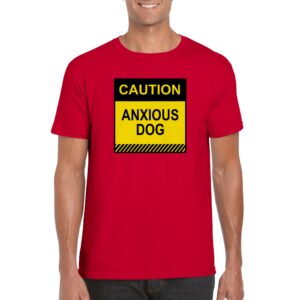Your cart is currently empty!
L-Tryptophan and 5-HTP

L-tryptophan and 5-HTP are both amino acids that are involved in the production of the neurotransmitter serotonin in the body. Serotonin is a neurotransmitter that plays an important role in regulating mood, appetite, sleep, and other bodily functions. In dogs, low levels of serotonin have been associated with increased aggression and other behavior problems.
Both L-tryptophan and 5-HTP are sometimes used as dietary supplements to support the production of serotonin in the body. Some people use them to help alleviate symptoms of depression, anxiety, insomnia, and other conditions that are thought to be related to low levels of serotonin.
Taking medications or supplements to increase serotonin levels will not have any change on behavior if there is no indication that serotonin levels are not already low.(5) In other words, these supplements will not help, and can potentially harm a normal dog who may have just learned to be aggressive. Other signs of anxiety should be present before considering this as an option to help.
Other supplements such as fish oil which can have many healthy benefits long term or L-theanine which can be useful short term for behavior modification or other acute anxiety, fears or phobias might be a safer supplements to try.
Levels of serotonin do not change quickly in the brain which is a good thing since it has a broad effect on the brain. “Serotonin is perhaps best known as a neurotransmitter that modulates neural activity and a wide range of neuropsychological processes” Typically increasing serotonin levels through medication or supplements takes a number of weeks.(6)
The Relationship between l-tryptophan and 5-hTP
L-tryptophan is found in many protein-rich foods, such as chicken, turkey, fish, and eggs. When you consume L-tryptophan, your body converts it into 5-HTP, which is then converted into serotonin.
However, ingesting more of these foods doesn’t necessarily make it more available to the brain because of the the need to compete with other amino acids in order to cross the blood-brain barrier. More on that that below.
5-HTP, on the other hand, is a compound that is derived from the seeds of the African plant Griffonia simplicifolia. It can also be synthesized in the laboratory. 5-HTP is a precursor to serotonin, which means that it is converted into serotonin in the brain.

Tryptophan
There is limited research on the use of tryptophan in dogs specifically, but some studies suggest that it may have potential benefits for canine behavior.
One study published in the Journal of Veterinary Behavior found that tryptophan supplementation reduced aggression and fear-related behaviors in dogs with a history of biting. Another study published in the Journal of Small Animal Practice found that tryptophan supplementation reduced separation anxiety and increased sociability in dogs.
In addition, tryptophan has been studied for its potential to reduce stress and anxiety in dogs during specific events, such as travel or veterinary visits. One study published in the Journal of Veterinary Behavior found that dogs given a tryptophan supplement before a veterinary visit showed reduced signs of anxiety and fear compared to dogs given a placebo.
L-trypotophan is the precursor of serotonin, and import neurotransmitter in the brain implicated in anxious and aggressive dogs. Diets supplemented with L-tryptophan may not change anxiety related behavior in dogs that don’t show clear signs of abnormal behavior.(5) While there are l_tryptophan supplements for dogs, most include other compounds which makes it difficult to tell what is having the effect.
Crossing the Blood Brain Barrier
The blood-brain barrier is a protective membrane that surrounds the brain and regulates what substances are able to pass through into the brain. It is designed to prevent potentially harmful substances from entering the brain, but it also makes it difficult for some beneficial substances to cross into the brain.
L-tryptophan needs to compete with other amino acids in order to cross the blood-brain barrier, which can limit the amount of tryptophan that is available to be converted into serotonin. This may be why some studies have indicated that a low-protein diet may help some aggressive dogs (1) as there are fewer amino acids to compete with.
5-HTP, on the other hand, is more easily transported across the blood-brain barrier and can be converted directly into serotonin in the brain. This is because 5-HTP is a smaller molecule than L-tryptophan and is more readily able to pass through the barrier.
Because of its ability to cross the blood-brain barrier more easily, 5-HTP is sometimes used as a supplement to increase serotonin levels in the brain, and may be more effective than L-tryptophan for this purpose. However there is sme research indicating 5_HTP in combination with other compounds such as the use anti-inflammatory compounds (CLA, Krill), pre/probiotics, and L-theanine may decrease aggressive behavior. (4)
However, it’s important to note that the use of L-tryptophan and 5-HTP as dietary supplements should be done under the guidance of a healthcare professional, as they can have side effects and interact with other medications.
Possible side effects
Do not add these supplements to any animal or person who is already taking SSRI medications.
Tryptophan and 5-HTP can have powerful effects and just because they can be bought as supplements, does not mean they should not be treated with as much as care as medications such as SSRIs that also effect serotonin levels.
There may be some side effects with ramping on to these medications that often, but not always, subside or go away completely once the brain has adjusted. It is important to start with only small amount at a time and increase medication over time.
Ramping down the medication when discontinuing is required. This means you decrease the medication by small increments over time periods as discussed with your veterinarian.
Side effects are often experienced going off these medications as well, so if you are using these, do not stop suddenly without consulting a veterinarian!
Warnings and Risks
Serotonin syndrome is a concern on both people and dogs for using any medications or supplements that affect serotonin activity in the brain.
L-Tryptophan and 5-HTP administration should not be done without guidance as administration can result in potentially life-threatening side effects that resemble serotonin syndrome in humans.
Reported side effects have included seizures, depression, tremors, hyperesthesia, and ataxia, vomiting or diarrhea, signs of abdominal pain, and hypersalivation, hyperthermia and transient blindness sometimes resulting in death (2, 3)
Dogs that are sensitive to these medications may exhibit lethargy or excessive salivation within the normal dose range. Doses greater than 8 mg/kg can cause tremors, while doses greater than 25 mg/kg are likely to cause seizures.(7)
Starting these supplements before or after any medication that affects serotonin activity should include a lengthy washout period.(7)
Supplements that include either Tryptophan or 5-HTP
Disclosure: We strive to offer genuine assistance based on thorough research and expertise. In some instances, we may suggest products that we believe can aid in addressing these challenges. It’s important to note that we may earn a commission from online retailers if we link to them and if you choose to purchase these recommended products through the links provided on our site. Look for “(promotion)” next to the link. This affiliate income, however, is modest and does not cover all our operational expenses. Our main goal is to give you the support and guidance you need, and our recommendations are driven by our commitment to assisting dog owners. Transparency and integrity are core values at K9aggression.com, and we want you to make informed decisions with complete confidence in our recommendations.
You can find both L-tryptophan and 5-HTP supplements on Amazon. Many of these used for pets are combined with other relaxing compounds such as Liquid NutriCalm Dogs & Cats (prmotion)
The use of L-tryptophan and 5-HTP as dietary supplements should be done under the guidance of a healthcare professional, as they can have serious side effects and interact with other medications.
Amazon.com only
Amazon.com only (However link may redirect you to the Amazon in your country where you may not be able to biy this product)
5-HTP Plus Formula for Mood, Stress, and Sleep (promtion)
Note, that you can only get this on Amazon.com. If the link automatically takes you to Amazon.ca, you may not find it.
5-HTP Plus Formula for Mood, Stress, and Sleep (promotion)
You may be interested in learning more about:
- L-theanine in Dogs: Anti-anxiety Effects
- Therapeutic aids for dog anxiety and aggression
- The Relationship Between Serotonin and Dog Aggression
References
(1)DeNapoli, J. S., Dodman, N. H., Shuster, L., Rand, W. M., & Gross, K. L. (2000). Effect of dietary protein content and tryptophan supplementation on dominance aggression, territorial aggression, and hyperactivity in dogs, Journal of the American Veterinary Medical Association, 217(4), 504-508. Retrieved Feb 28, 2023, from https://avmajournals.avma.org/view/journals/javma/217/4/javma.2000.217.504.xmhttps://doi.org/10.2460/javma.2000.217.504
(2) 5-Hydroxytryptophan toxicosis in dogs: 21 cases (1989-1999), July 2000, Journal of the American Veterinary Medical Association 216(12):1937-4, Retrieved Feb 27, 2023,from DOI:10.2460/javma.2000.216.1937
(3) Dipace v, Tryptophan effect on dog behavior: a review. Vol. 1 No. 3 (2015) Retrieved Feb 27, 2023, from https://dogbehavior.it/dogbehavior/article/view/18,
(4) Simona Cannas, Barbara Tonini, Benedetta Belà, Roberta Di Prinzio, Giulia Pignataro, Daniele Di Simone, Alessandro Gramenzi,
Effect of a novel nutraceutical supplement (Relaxigen Pet dog) on the fecal microbiome and stress-related behaviors in dogs: A pilot study, Journal of Veterinary Behavior, Volume 42, 2021, Pages 37-47, ISSN 1558-7878, Retrieved Feb 28, 2023 https://doi.org/10.1016/j.jveb.2020.09.002.
(5)Guido Bosch, Bonne Beerda, Anton C. Beynen, Joanne A.M. van der Borg, Antonius F.B. van der Poel, Wouter H. Hendriks, Dietary tryptophan supplementation in privately owned mildly anxious dogs, Applied Animal Behaviour Science, Volume 121, Issues 3–4, 2009, Retrieved Feb 27, 2023, https://doi.org/10.1016/j.applanim.2009.10.003.
(6)Berger M, Gray JA, Roth BL. The expanded biology of serotonin. Annu Rev Med. 2009;60:355-66. doi: 10.1146/annurev.med.60.042307.110802. PMID: 19630576; PMCID: PMC5864293. Retrieved Feb 28, 2023 from https://www.ncbi.nlm.nih.gov/pmc/articles/PMC5864293/
(7) Sharon L. Crowell-Davis, DVM, PhD, DACVB* Sabrina Poggiagliolmi, DVM Serotonin Syndrome, Understanding Behavior, The University of Georgia, Retrieved Feb 28, 2023 from http://vetfolio-vetstreet.s3.amazonaws.com/mmah/ac/52ee36b35c4d38b06d33906d878046/filePV_30_09_490.pdf
ADVERTISEMENT
The Dog Aggression System Every Dog Owner Needs E-book

Anxious Dog Shirts only available in our shop

Keep people away with our Stand back shirts
ADVERTISEMENT
ADVERTISEMENT
Tags:

